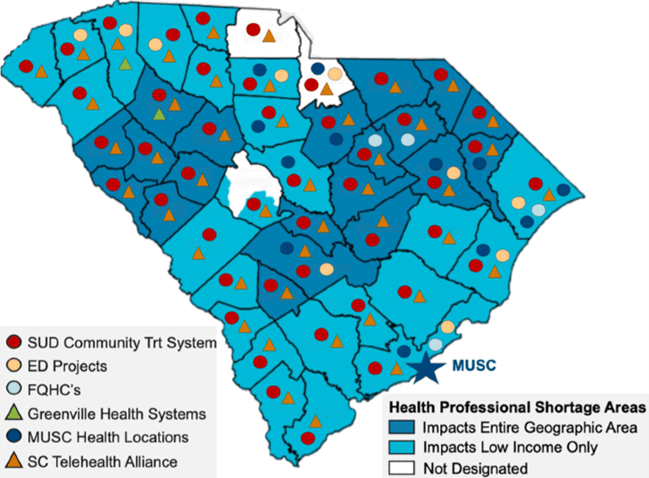SCN Statewide Partnerships
The SCN team has developed deep and robust statewide collaborations. We work closely with the South Carolina Department of Alcohol and Other Drug Abuse Services (DAODAS), community treatment programs state-wide, the state legislature, the SC Department of Health and Human Services (DHHS) and medical providers throughout the state (FQHCs). We also have strong affiliations with healthcare systems and other research Universities statewide as well as the South Carolina AHEC system.

The SCN's regional partners in Georgia, Alabama, Mississippi, Louisiana and Northern Florida are located in primarily rural areas with overall health rankings in the lowest quartile in 2018. The poverty rate in these states is higher than the national average, and all have, on average, over 10% uninsured population. Over 60% of designated Primary Care, Dental Health and Mental Health Professional Shortage Areas (HPSAs) in the United States are in rural areas. For all six states in our consortium, the vast majority of counties are considered HPSAs for both primary care and mental health. Additionally, 5 of the 6 states in our consortium are non-Medicaid expansion states.
The opioid epidemic has drawn particular attention to the shortfall of mental health and SUD treatment providers and facilities in rural areas. Both historically and currently, the southern US has the greatest substance use services disparities and facilities that provide comprehensive SUD treatment services are extremely limited. Unique barriers to recovery for individuals in rural areas include geographic proximity to services, transportation difficulties, financial burden and stigma/privacy concerns in small towns. Technology, particularly home-based tele-visits, can play a critical role in overcoming some of these barriers.
Although the findings from SCN studies will have broad applicability to the treatment of SUD in a variety of settings nationwide, we will make addressing the pressure points across the continuum of care for SUDs a primary focus of the SCN research agenda.

























